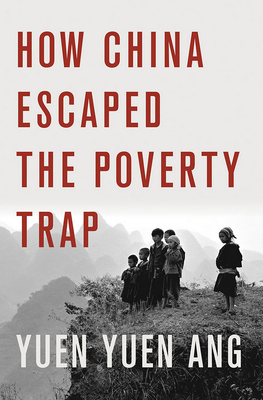How China Escaped the Poverty Trap

How China Escaped the Poverty Trap
Acclaimed as game changing and field shifting, How China Escaped the Poverty Trap advances a new paradigm in the political economy of development and sheds new light on China's rise. How can poor and weak societies escape poverty traps? Political economists have traditionally offered three answers: stimulate growth first, build good institutions first, or some fortunate nations inherited good institutions that led to growth. Yuen Yuen Ang rejects all three schools of thought and their underlying assumptions: linear causation, a mechanistic worldview, and historical determinism. Instead, she launches a new paradigm grounded in complex adaptive systems, which embraces the reality of interdependence and humanity's capacity to innovate. Combining this original lens with more than 400 interviews with Chinese bureaucrats and entrepreneurs, Ang systematically reenacts the complex process that turned China from a communist backwater into a global juggernaut in just 35 years. Contrary to popular misconceptions, she shows that what drove China's great transformation was not centralized authoritarian control, but directed improvisation--top-down directions from Beijing paired with bottom-up improvisation among local officials. Her analysis reveals two broad lessons on development. First, transformative change requires an adaptive governing system that empowers ground-level actors to create new solutions for evolving problems. Second, the first step out of the poverty trap is to use what you have--harnessing existing resources to kick-start new markets, even if that means defying first-world norms. Bold and meticulously researched, How China Escaped the Poverty Trap opens up a whole new avenue of thinking for scholars, practitioners, and anyone seeking to build adaptive systems.
Before markets opened in 1978, China was an impoverished planned economy governed by a Maoist bureaucracy. In just three decades it evolved into the world's second-largest economy and is today guided by highly entrepreneurial bureaucrats. In How China Escaped the Poverty Trap, Yuen Yuen Ang explains this astonishing metamorphosis. Rather than insist that either strong institutions of good governance foster markets or that growth enables good governance, Ang lays out a new, dynamic framework for understanding development broadly. Successful development, she contends, is a coevolutionary process in which markets and governments mutually adapt. By mapping this coevolution, Ang reveals a
PRP: 854.53 Lei
Acesta este Pretul Recomandat de Producator. Pretul de vanzare al produsului este afisat mai jos.
769.08Lei
769.08Lei
854.53 LeiIndisponibil
Descrierea produsului
Acclaimed as game changing and field shifting, How China Escaped the Poverty Trap advances a new paradigm in the political economy of development and sheds new light on China's rise. How can poor and weak societies escape poverty traps? Political economists have traditionally offered three answers: stimulate growth first, build good institutions first, or some fortunate nations inherited good institutions that led to growth. Yuen Yuen Ang rejects all three schools of thought and their underlying assumptions: linear causation, a mechanistic worldview, and historical determinism. Instead, she launches a new paradigm grounded in complex adaptive systems, which embraces the reality of interdependence and humanity's capacity to innovate. Combining this original lens with more than 400 interviews with Chinese bureaucrats and entrepreneurs, Ang systematically reenacts the complex process that turned China from a communist backwater into a global juggernaut in just 35 years. Contrary to popular misconceptions, she shows that what drove China's great transformation was not centralized authoritarian control, but directed improvisation--top-down directions from Beijing paired with bottom-up improvisation among local officials. Her analysis reveals two broad lessons on development. First, transformative change requires an adaptive governing system that empowers ground-level actors to create new solutions for evolving problems. Second, the first step out of the poverty trap is to use what you have--harnessing existing resources to kick-start new markets, even if that means defying first-world norms. Bold and meticulously researched, How China Escaped the Poverty Trap opens up a whole new avenue of thinking for scholars, practitioners, and anyone seeking to build adaptive systems.
Before markets opened in 1978, China was an impoverished planned economy governed by a Maoist bureaucracy. In just three decades it evolved into the world's second-largest economy and is today guided by highly entrepreneurial bureaucrats. In How China Escaped the Poverty Trap, Yuen Yuen Ang explains this astonishing metamorphosis. Rather than insist that either strong institutions of good governance foster markets or that growth enables good governance, Ang lays out a new, dynamic framework for understanding development broadly. Successful development, she contends, is a coevolutionary process in which markets and governments mutually adapt. By mapping this coevolution, Ang reveals a
Detaliile produsului








